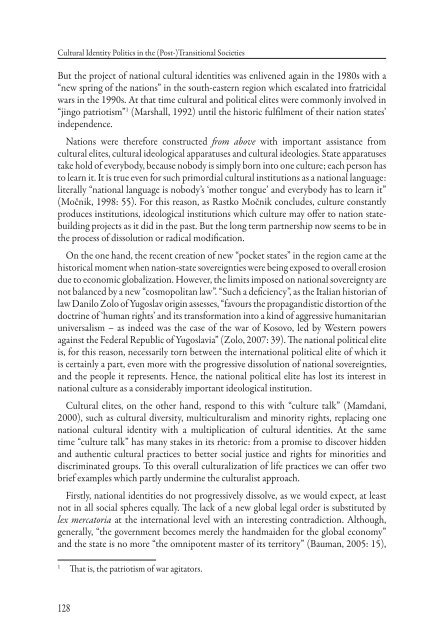free download in pdf format - Culturelink Network
free download in pdf format - Culturelink Network
free download in pdf format - Culturelink Network
You also want an ePaper? Increase the reach of your titles
YUMPU automatically turns print PDFs into web optimized ePapers that Google loves.
Cultural Identity Politics <strong>in</strong> the (Post-)Transitional Societies<br />
But the project of national cultural identities was enlivened aga<strong>in</strong> <strong>in</strong> the 1980s with a<br />
“new spr<strong>in</strong>g of the nations” <strong>in</strong> the south-eastern region which escalated <strong>in</strong>to fratricidal<br />
wars <strong>in</strong> the 1990s. At that time cultural and political elites were commonly <strong>in</strong>volved <strong>in</strong><br />
“j<strong>in</strong>go patriotism” 1 (Marshall, 1992) until the historic fulfi lment of their nation states’<br />
<strong>in</strong>dependence.<br />
Nations were therefore constructed fr om above with important assistance from<br />
cultural elites, cultural ideological apparatuses and cultural ideologies. State apparatuses<br />
take hold of everybody, because nobody is simply born <strong>in</strong>to one culture; each person has<br />
to learn it. It is true even for such primordial cultural <strong>in</strong>stitutions as a national language:<br />
literally “national language is nobody’s ‘mother tongue’ and everybody has to learn it”<br />
(Močnik, 1998: 55). For this reason, as Rastko Močnik concludes, culture constantly<br />
produces <strong>in</strong>stitutions, ideological <strong>in</strong>stitutions which culture may off er to nation statebuild<strong>in</strong>g<br />
projects as it did <strong>in</strong> the past. But the long term partnership now seems to be <strong>in</strong><br />
the process of dissolution or radical modifi cation.<br />
On the one hand, the recent creation of new “pocket states” <strong>in</strong> the region came at the<br />
historical moment when nation-state sovereignties were be<strong>in</strong>g exposed to overall erosion<br />
due to economic globalization. However, the limits imposed on national sovereignty are<br />
not balanced by a new “cosmopolitan law”. “Such a defi ciency”, as the Italian historian of<br />
law Danilo Zolo of Yugoslav orig<strong>in</strong> assesses, “favours the propagandistic distortion of the<br />
doctr<strong>in</strong>e of ‘human rights’ and its trans<strong>format</strong>ion <strong>in</strong>to a k<strong>in</strong>d of aggressive humanitarian<br />
universalism – as <strong>in</strong>deed was the case of the war of Kosovo, led by Western powers<br />
aga<strong>in</strong>st the Federal Republic of Yugoslavia” (Zolo, 2007: 39). Th e national political elite<br />
is, for this reason, necessarily torn between the <strong>in</strong>ternational political elite of which it<br />
is certa<strong>in</strong>ly a part, even more with the progressive dissolution of national sovereignties,<br />
and the people it represents. Hence, the national political elite has lost its <strong>in</strong>terest <strong>in</strong><br />
national culture as a considerably important ideological <strong>in</strong>stitution.<br />
Cultural elites, on the other hand, respond to this with “culture talk” (Mamdani,<br />
2000), such as cultural diversity, multiculturalism and m<strong>in</strong>ority rights, replac<strong>in</strong>g one<br />
national cultural identity with a multiplication of cultural identities. At the same<br />
time “culture talk” has many stakes <strong>in</strong> its rhetoric: from a promise to discover hidden<br />
and authentic cultural practices to better social justice and rights for m<strong>in</strong>orities and<br />
discrim<strong>in</strong>ated groups. To this overall culturalization of life practices we can off er two<br />
brief examples which partly underm<strong>in</strong>e the culturalist approach.<br />
Firstly, national identities do not progressively dissolve, as we would expect, at least<br />
not <strong>in</strong> all social spheres equally. Th e lack of a new global legal order is substituted by<br />
lex mercatoria at the <strong>in</strong>ternational level with an <strong>in</strong>terest<strong>in</strong>g contradiction. Although,<br />
generally, “the government becomes merely the handmaiden for the global economy”<br />
and the state is no more “the omnipotent master of its territory” (Bauman, 2005: 15),<br />
1 Th at is, the patriotism of war agitators.<br />
128



